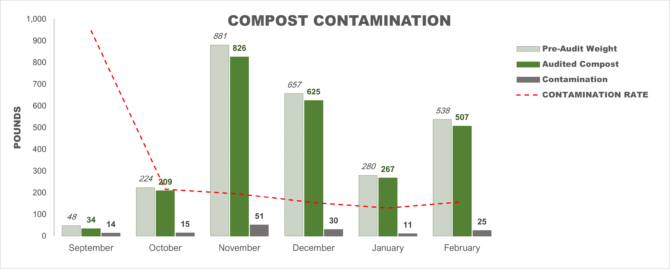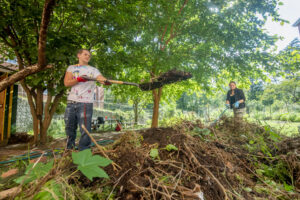Composting Pilot Update
The Zero Waste Mason goal is to divert 90% of the university’s waste away from the incineration via reduction, reuse, recycling, and composting. To achieve this goal, waste reduction, reuse, and diversion strategies like composting are needed.
With operational support from Facilities Management and financing from the Patriot Green Fund, Mason's first Industrial Composting Pilot was successfully installed zero waste bin upgrades at the Starbucks Northern Neck site in 2022. This was made possible with partnership from Mason’s Auxiliary Services and Dining teams who piloted this imitative in support of the Zero Waste Mason goal.
Industrial compost bins accept both third-party certified compostable items along with all types of food scraps. Check your compostable foodservice ware items for a BPI or CMA certification mark before disposing them at one of Mason’s industrial composting locations!
Locating the recycling, trash, and compost bins together (co-location) increases access for Mason Patriots to appropriately dispose of their waste. Mason Facilities Zone 6 and Recycling teams expanded the pre-existing Bigbelly Solar waste and recycling station (installed in fall 2021) on the Starbucks patio by adding a compost bin. In addition, they replaced separate trash, recycling, and compost bins inside the lobby with a Max-R station, co-locating all the bins in a single station.
- The Max-R zero waste station is made of approximately 1,655 reclaimed milk jugs – key to supporting post-consumer recycled (PCR) purchasing goals and guidance.It offers updated zero waste design features, like waste stream co-location, restrictive lid openings, and color-coded messaging.
- The Bigbelly Solar station was upgraded with an additional solar-powered compost bin, equipped with smart-waste management design features that send Waste and Recycling team members notification alerts when bins need to be emptied in real-time.
The industrial composting pilot was such a success, Strategic Investment Fund finances were secured by University Sustainability and used to install 23 Bigbelly zero waste stations.
Bigbelly zero waste stations provide public composting access at 6 Fairfax Campus locations. They support the Zero Waste Mason goal, as well as new strategies to co-locate all waste and recycling bins while installing standardized bin messaging across all campus disposal locations.
Explore the 2022 Industrial Composting Pilot’s results and the impact of the new Bigbelly zero waste station locations below.
To benchmark the composting pilot’s progress toward the Zero Waste Mason goal, weekly compost contamination audits were conducted from September 2022 – February 2023.
Weekly audits ensured that the contamination rate (non-compostable items disposed in the compost) was 10% or less. If the contamination rate exceeded 10%, then the compost would be rejected by Mason's industrial composting partner, Freestate Farms.
By the end of the six-month pilot period, significant improvements from the industrial composting pilot efforts were clear:

Bigbelly zero waste stations provide public composting access at 6 Fairfax Campus locations. They support the Zero Waste Mason goal, as well as new strategies to co-locate all waste and recycling bins while installing standardized bin messaging across all campus disposal locations.
- 1,000%+ increase in clean compost produced during the final month of the pilot in comparison to the first
- 2,467 pounds of clean compost diverted from trash over the 6-month pilot period
- 79% improvement in compost contamination over the 6-month period
- 45% interior compost contamination rate during the first week
- 3% interior compost contamination rate during the final week
- 6% average monthly compost contamination rate, exceeding the local industrial composting facility’s maximum 10% standard for acceptance
The Industrial Composting Pilot recorded a positive trend in contamination reduction. The pilot’s data collection and assessment efforts supported:
- Updates to the picture-based messaging and Spanish translations included in Facilities’ new standard waste bin labels
- Mason Dining’s inclusion of composting guidance and training procedures in staff orientations
- The expanded deployment of Bigbelly Solar zero waste stations on two campuses with financing from Mason’s Strategic Investment Fund
| Bigbelly Solar Locations: | Zero Waste Station Type: |
| HUB FOOD PATIO | Recycling, Waste, Compost Triple Station |
| MERTEN HALL FOOD PATIO (PANDA EXPRESS) | Recycling, Waste, Compost Triple Station |
| MERTEN HALL FOOD PATIO (MANHATTAN PIZZA) | Recycling, Waste, Compost Triple Station |
| SOUTHSIDE FOOD PATIO | Recycling, Waste, Compost Triple Station |
| SUB I FOOD PATIO | Recycling, Waste, Compost Triple Station |
| STARBUCKS NORTHERN NECK FOOD PATIO (PILOT) | Recycling, Waste, Compost Triple Station |
| FENWICK LIBRARY (NEAR FENWICK A) | Recycling and Waste Double Station |
| EAST PLAZA/JC PATH | Recycling and Waste Double Station |
| SUB I UPPER ENTRANCE | Recycling and Waste Double Station |
| WILKINS PLAZA (BETWEEN HORIZON AND JC) | Recycling and Waste Double Station |
| WILKINS PLAZA (BETWEEN HARRIS THEATER AND JC) | Recycling and Waste Double Station |
| CENTER FOR THE ARTS/BUCHANAN HALL PATH | Recycling and Waste Double Station |
| ENTERPRISE/PLANETARY HALL PATH | Recycling and Waste Double Station |
| THE GROVE/ENGINEERING PATH | Recycling and Waste Double Station |
| THE RAC (NEAR BIKE RACKS/SHUTTLE) | Recycling and Waste Double Station |
| WILKINS PLAZA (NEAR MASON POND PARKING DECK) | Recycling and Waste Double Station |
| PATRIOT CIRCLE @SANDY CREEK LN | Recycling and Waste Double Station |
| NOTTOWAY ANNEX PATH | Recycling and Waste Double Station |
| PATRIOT CIRCLE @PRESIDENTS PARK | Recycling and Waste Double Station |
| PATRIOT CIRCLE @LOT K ENTRANCE | Recycling and Waste Double Station |
| PATRIOT CIRCLE @MATTAPONI R LN (LOT A) | Recycling and Waste Double Station |
| PATRIOT CIRCLE @RAPPAHANNOCK PARKING DECK | Recycling and Waste Double Station |
| WEST CAMPUS (SHUTTLE STOP) | Recycling and Waste Double Station |
| JC EAST ENTRANCE (EAST PLAZA) | Recycling and Waste Double Station |
| JC NORTHEAST ENTRANCE (PANERA) | Recycling and Waste Double Station |
| JC WEST ENTRANCE (CHIPOTLE) | Recycling and Waste Double Station |
| JC SOUTH PATIO | Recycling and Waste Double Station |
| VAN METRE HALL PLAZA (MASON SQUARE CAMPUS) | Recycling and Waste Double Station |
All Bigbelly zero waste station recycling bins accept ‘Cans and Bottles’ recycling ONLY.
New zero waste sites are always being added to the Sustainable Mason Map, check back to find locations and resources near you!
‘Backyard’ Composting Piles on the Fairfax Campus

Mason’s Potomac Heights Vegetable Garden and Innovation Food Forest include outdoor compost piles for disposing of fruit and vegetable scraps only. All Mason community members can dispose of ‘backyard’ compostable materials at on-campus composting piles.
- Check out this flyer to learn how to sort your compost at Mason!
- Explore our Zero Waste Mason page for additional composting guidance.
